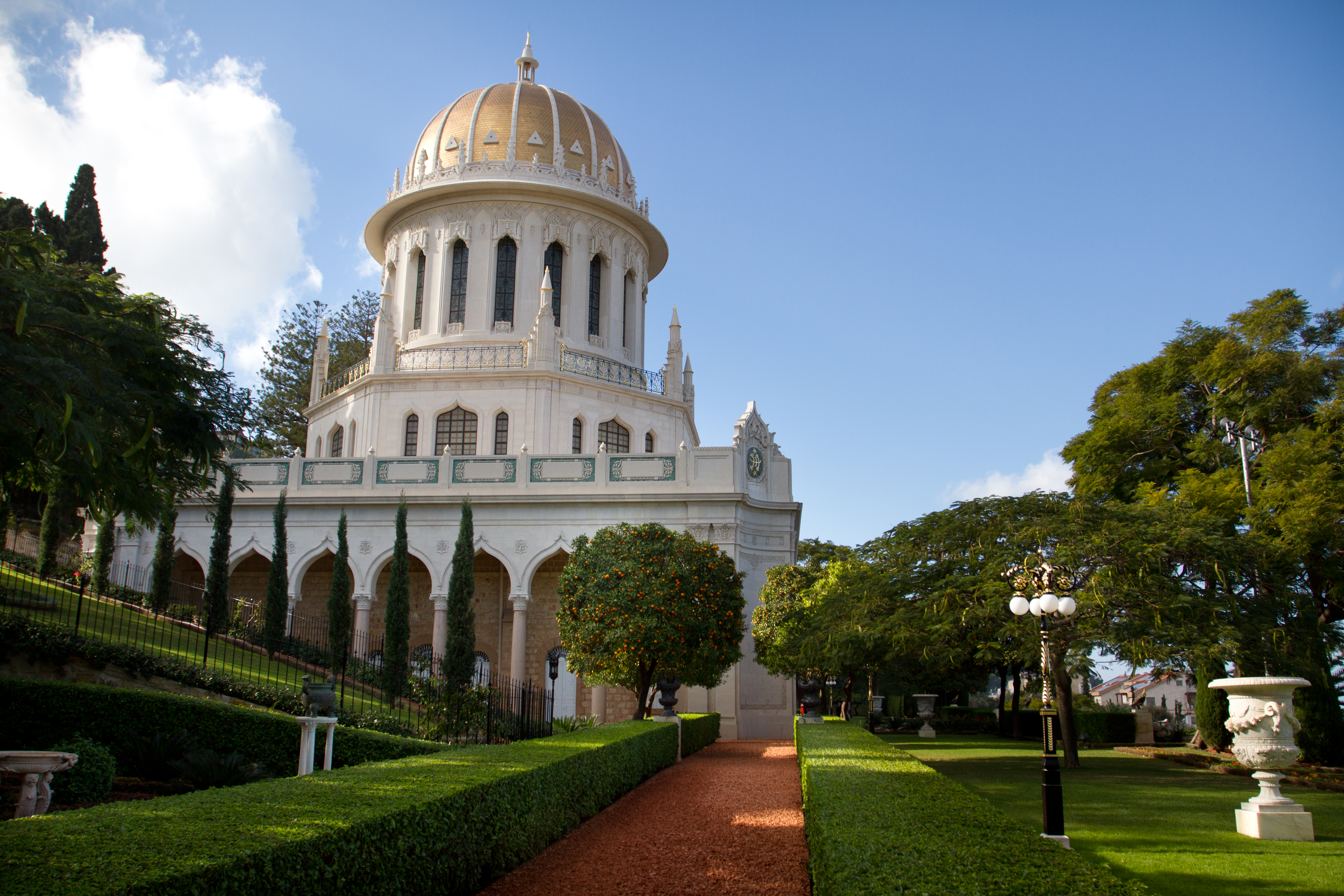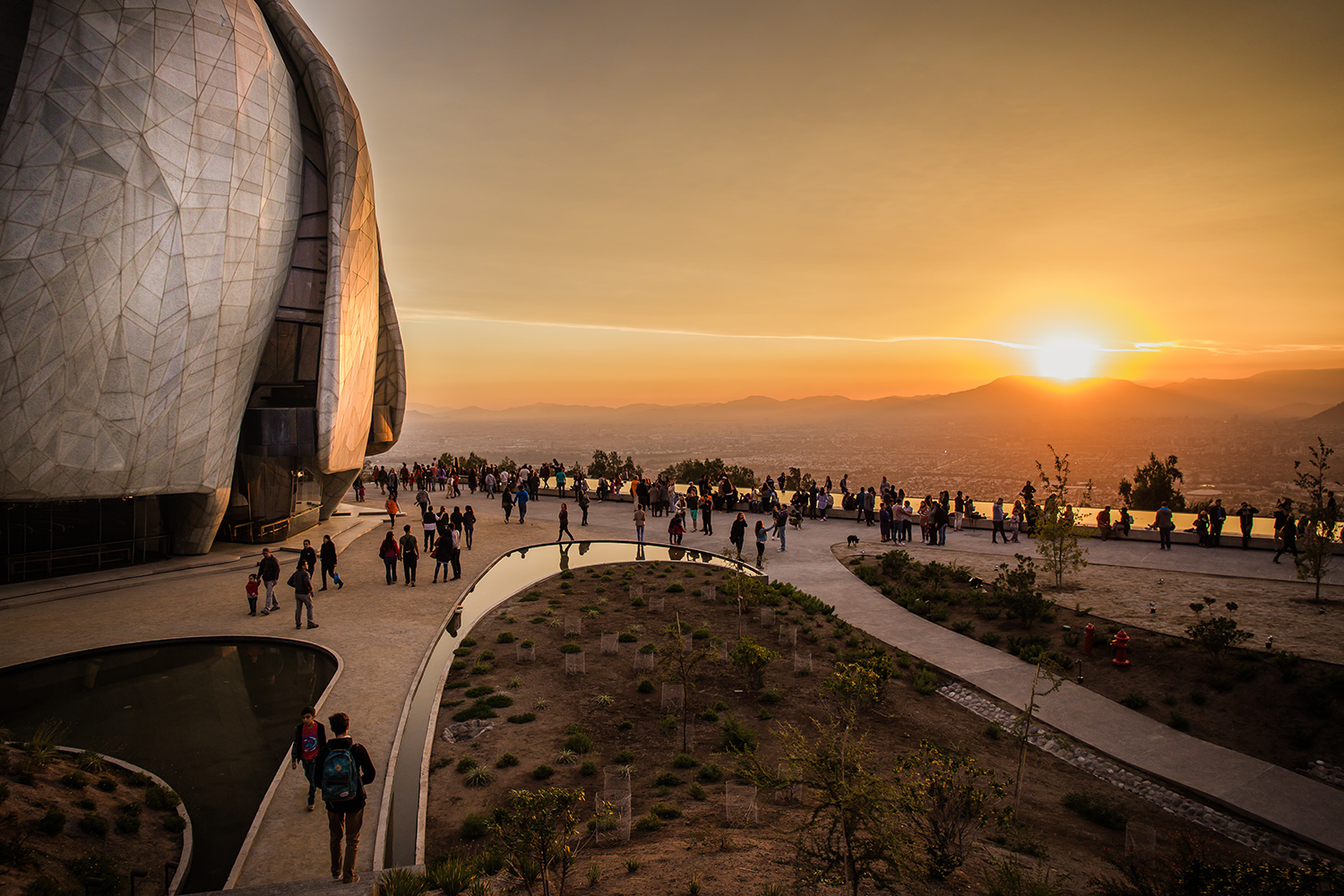The following is part of our series exploring the Gospels and how they are illuminated by the Revelation of Baha’u’llah. Today’s post is about how each revelation was heralded by a Prophet who prepared the people for the revelation.
All four of the Gospels begin with the story of John the Baptist- a man described as the one “crying in the wilderness”. The expression comes from the Hebrew Bible, where the prophet Isaiah foretold that one would come before the Messiah, to prepare the way and “make straight the path” to Him. The Gospels describe John the Baptist as a prophetic figure, but the actual teachings he brought are obscure, other than the fact that he challenged the clergy and taught the repentance of sins for the “Kingdom of God’ was “drawing near’. Though he wore simple clothes of “camel’s hair” and ate “wild locusts”, the people “flocked to him”, even from out of Jerusalem and the surrounding countryside. He was known for baptizing people by submerging them in water briefly, which he did in the river Jordan as a sign of spiritual transformation.
John the Baptist was a controversial figure in his time. The center of religious authority was Jerusalem where the Jewish priestly structure held sway, and John clearly challenged that authority, referring to them as a “brood of vipers” and undermining their claims to authority as being the “children of Abraham”, stating that “God could produce children of Abraham out of these stones!”. Though Christ’s message would come to be known as one of love, John the Baptist’s message clearly had a sharper edge, particularly as he described the Messiah who was to come- “The axe already lies at the root of the tree, and the tree that fails to produce good fruit will be cut down and thrown into the fire. It is true that I baptise you with water as a sign of your repentance, but the one who follows me is far stronger than I am – indeed I am not fit to carry his shoes. He will baptise you with the fire of the Holy Spirit. He comes all ready to separate the wheat from the chaff and very thoroughly will he clear his threshing-floor – the wheat he will collect into the granary and the chaff he will burn with a fire that can never be put out.”
John the Baptist’s preaching overlapped with that of Jesus Himself, and John spoke of Jesus with great respect, describing Jesus as one whose “sandals he would not be worthy to untie”. When Jesus came to the river to Himself be baptized, John said he was not worthy to baptize Him. With some prodding, he agreed. at which point the Gospels describe that “suddenly the heavens opened and he saw the Spirit of God coming down like a dove and resting upon him (Jesus). And a voice came out of Heaven saying, “This is my dearly-loved son, in whom I am well pleased.” When John referred to Jesus as the “Lamb of God” and the Messiah he had come to foretell, many of his followers turned to Jesus and became his early followers.
Some of John’s followers became suspicious of Jesus’ teaching and did not immediately accept Him, particularly when he freely associated with “tax collectors and sinners”. In one dialogue, John’s followers prodded Jesus on why he and His followers were not adherent to the fasting laws, Jesus replied “How can the guests of the bridegroom mourn while he is with them? The time will come when the bridegroom will be taken from them; then they will fast. No one sews a patch of unshrunk cloth on an old garment, for the patch will pull away from the garment, making the tear worse. Neither do people pour new wine into old wineskins. If they do, the skins will burst; the wine will run out and the wineskins will be ruined. No, they pour new wine into new wineskins, and both are preserved.”
This point about not pouring “new wine into old wineskins” is important, as it clearly reflects that Jesus’ new revelation was not going to be just an extension of traditional Judaism. Whereas John the Baptist appears not to have broken with Jewish law, and even seems to have encouraged that people follow it more strictly, Jesus took the stronger step of assuming authority to change it entirely. One of the more interesting dialogues in the Gospel is when Jesus is asked about the laws of divorce-
“Then the Pharisees arrived with a test-question. “Is it right,” they asked, “for a man to divorce his wife on any grounds whatever?” “Haven’t you read,” he answered, “that the one who created them from the beginning ‘made them male and female’ and said: ‘For this reason a man shall leave his father and mother and be joined to his wife, and the two shall become one flesh’? So they are no longer two separate people but one. No man therefore must separate what God has joined together.” “Then why,” they retorted, “did Moses command us to give a written divorce-notice and dismiss the woman?”. “It was because you knew so little of the meaning of love that Moses allowed you to divorce your wives! But that was not the original principle. I tell you that anyone who divorces his wife on any grounds except her unfaithfulness and marries some other woman commits adultery.”
With this statement, as well as others in the Gospels, Jesus was taking the challenging step of assuming the right to abrogate the laws of Moses- a clear challenge to the religious authority of the day and a statement that he was bringing a new revelation and founding a genuinely new religion. He was also asking them to adhere to a higher principle than they previously had been trained, stating that Moses didn’t hold them to it because “their hearts were hard”, a reference to the fact that they had spiritually evolved since the time of Moses and were now ready for a higher standard.
Not only was there an evolution of the teaching from Moses revelation to that of Jesus, but even within Jesus’ own Revelation, we see the gradual unfoldment of His message as the people developed more capacity. John the Baptist came and garnered the attention of a large population, ultimately funneling their attention into the one who was to come after him, to whom he swore personal allegiance. Jesus initially didn’t challenge Jewish law, but within his own revelation unfolded it gradually until the people were ready for the proclamation of a new religion. Indeed, it was the challenging claims He made that eventually led to His crucifixion.
When we turn our attention to Baha’u’llah’s Revelation, we see a similar process unfold. The Baha’i Faith is typically said to have been started when a young theology student named Mulla Husayn, who had been taught by his teachers that the messiah of his religion was about to come, met a young merchant from Shiraz Persia known as the Báb (the “Gate”). The Báb invited Mulla Husayn to have tea with him, and in that meeting, the Báb was asked questions that led him to reveal, for the first time, a text that clearly spoke with divine authority. Mullah Husayn would later describe the experience of listening to the Báb reveal his earliest text-
I sat spellbound by His utterance, oblivious of time and of those who awaited me. Suddenly the call of the muadhdhin, summoning the faithful to their morning prayer, awakened me from the state of ecstasy into which I seemed to have fallen. All the delights, all the ineffable glories, which the Almighty has recounted in His Book as the priceless possessions of the people of Paradise–these I seemed to be experiencing that night
For the next four years, Mulla Husayn and eighteen other fellow disciples, all who had come to be convinced of the Báb’s divinity, spread out throughout Persia to preach the new Faith. Thousands of people responded to the message and it became a truly mass movement. Though the Báb’s writings were spiritually exhilarating, it was not clear what exactly He was claiming. His Writings were superficially ambiguous, though if you read with attention, it was obvious He was claiming divine revelation. Nevertheless, the ambiguity allowed His message to spread while holding back the severe persecution that would result if His true claims were broadcast. Death was the punishment for the crime of apostasy in His society. To claim a new revelation was unthinkable. For that reason, He did not initially reveal a new law, and indeed asked his followers to excel in their strict following of Islamic law.
It wasn’t until 1848, four years after His initial declaration to Mulla Husayn, when the Báb was brought before a council of priests, in the presence of the Crown Prince, that he formally declared his mission publicly, in dramatic fashion. After enduring several questions about his use or misuse of Arabic grammar in his writings, the Báb abruptly stood up and declared “I am the Promised One, I am the one whose name you have for a thousand years invoked, at whose mention you have risen, and who advent you have prayed God to hasten”. Such a blasphemous claim from a 25 y.o. merchant, untrained in any religious school, was more than the leaders could take, and they ordered he be beaten and imprisoned. Nearly simultaneous with this event, a conference of his followers was occurring in which one of the Báb’s most ardent followers, a woman and talented poetess named Tahirih, removed her veil in the presence of other men, signaling that Islamic law had formally been abrogated in the new religion- a move that the Báb later condoned.
From that point on, the Báb was made a prisoner in a far flung fortress in the north of Persia and his Writings dramatically shifted. His claims were now crystal clear and he laid out the new theology of progressive revelation of religious truth, coming from an otherwise unknowable God. He began to refer to His works as the “Bayan”, meaning “Exposition”. But contrary to all expectations and prophecies, the Báb said that He Himself was sent to prepare the way for the one who would come after Him- the revelation of the exalted figure He described as “Him Whom God Shall Make Manifest”- the person who would come to be known as Baha’u’llah. The young prophet’s description of Baha’u’llah is extraordinarily compelling and He clearly stated the entire purpose of His movement was to prepare a population who could accept Him- to “make straight the path” to Him.
The glory of Him Whom God shall make manifest is immeasurably above every other glory, and His majesty is far above every other majesty. His beauty excelleth every other embodiment of beauty, and His grandeur immensely exceedeth every other manifestation of grandeur. Every light paleth before the radiance of His light, and every other exponent of mercy falleth short before the tokens of His mercy…
It behooveth you to await the Day of the appearance of Him Whom God shall manifest. Indeed My aim in planting the Tree of the Bayán hath been none other than to enable you to recognize Me. In truth I Myself am the first to bow down before God and to believe in Him. Therefore let not your recognition become fruitless, inasmuch as the Bayán, notwithstanding the sublimity of its station, beareth fealty to Him Whom God shall make manifest, and it is He Who beseemeth most to be acclaimed as the Seat of divine Reality, though indeed He is I and I am He. However, when the Tree of the Bayán attaineth its highest development, We shall bend it low as a token of adoration towards its Lord Who will appear in the person of Him Whom God shall make manifest. Perchance ye may be privileged to glorify God as it befitteth His august Self.
The Báb occasionally used metaphors akin to the Gospels to illustrate this point- like this one, which is similar to Jesus’ parable of the vineyard-
You are like unto the man who layeth out an orchard and planteth all kinds of fruit trees therein. When the time is at hand for him, the lord, to come, ye will have taken possession of the orchard in his name, and when he doth come in person, ye will shut him out from it…We have planted the Garden of the Bayán in the name of Him Whom God will make manifest, and have granted you permission to live therein until the time of His manifestation; then from the moment the Cause of Him Whom God will make manifest is inaugurated, We forbid you all the things ye hold as your own, unless ye may, by the leave of your Lord, be able to regain possession thereof.
In July of 1850, the Báb was brought to the city of Tabriz and executed by a firing squad of 750 rifles. On the eve of His execution, He was interviewed by a British physician who was sent to determine if he was sane, as His claims were punishable by death but they wanted to ensure He was making them with a sound mind. The physician described Him and shared some of his experience in a letter to a British historian-
You ask me for some particulars of my interview with the founder of the sect known as Babis. Nothing of any importance transpired in this interview, as the Báb was aware of my having been sent with two other Persian doctors to see whether he was of sane mind or merely a madman, to decide the question whether he was to be put to death or not. With this knowledge he was loth to answer any questions put to him. To all enquiries he merely regarded us with a mild look, chanting in a low melodious voice some hymns, I suppose. Two other Siyyids, his intimate friends, were also present, who subsequently were put to death with him, besides a couple of government officials. He only deigned to answer me, on my saying that I was not a Muslim and was willing to know something about his religion, as I might perhaps be inclined to adopt it. He regarded me very intently on my saying this, and replied that he had no doubt of all Europeans coming over to his religion.
By any measure, the Báb’s Revelation was extremely effective. He had raised up a new community in one of the religiously perilous parts of the world, now essentially divorced from the religion of their birth, and chastened them to accept the One who was to come after Him. Baha’u’llah himself would assume the mantle of authority of the Báb’s movement soon after the execution of the Báb in 1850. Even then, he would devote another 10 years encouraging and evolving the conceptions of the community before declaring His own Revelation formally, and founding a new world religion.
The Báb and John the Baptist have been compared to each other, and there are indeed many similarities. Both heralded a divine revelation, gathering a group of followers, most of whom accepted the revelation they came to foretell. Their messages were very challenging to the religious establishment of their time, and they were both executed for their teachings. With the Báb however, we have a much clearer demonstration of what it means to “make straight the path” to a new revelation. We can see that God is actually very aware of our situation, and the challenges we face in accepting a new Revelation from God. He gradually unveils the claims of the new Revelation so that we can come to a new understanding in an evolutionary way. The Báb explicitly states that “in His first Book, (He) enjoined the observance of the laws of the Qur’án, so that the people might not be seized with perturbation by reason of a new Book and a new Revelation and might regard His Faith as similar to their own, perchance they would not turn away from the Truth and ignore the thing for which they had been called into being.”
Baha’u’llah Himself would later explain the principle in action here
Know of a certainty that in every Dispensation the light of Divine Revelation hath been vouchsafed unto men in direct proportion to their spiritual capacity. Consider the sun. How feeble its rays the moment it appeareth above the horizon. How gradually its warmth and potency increase as it approacheth its zenith, enabling meanwhile all created things to adapt themselves to the growing intensity of its light. How steadily it declineth until it reacheth its setting point. Were it, all of a sudden, to manifest the energies latent within it, it would, no doubt, cause injury to all created things…. In like manner, if the Sun of Truth were suddenly to reveal, at the earliest stages of its manifestation, the full measure of the potencies which the providence of the Almighty hath bestowed upon it, the earth of human understanding would waste away and be consumed; for men’s hearts would neither sustain the intensity of its revelation, nor be able to mirror forth the radiance of its light.
We owe a great deal to John the Baptist and the Báb. Their missions were difficult ones, as they were on the front lines of the unfoldment of a new Revelation, and their early followers were “first responders”. No wonder that their missions have come to be associated with the quality of sacrifice- given of oneself that others may benefit. Many of the Báb’s prayers and writings bear testimony to the sacrifices He endured and we’ll conclude this essay with one significant passage-
I, verily, have not fallen short of My duty to admonish that people, and to devise means whereby they may turn towards God, their Lord, and believe in God, their Creator. If, on the day of His Revelation, all that are on earth bear Him allegiance, Mine inmost being will rejoice, inasmuch as all will have attained the summit of their existence, and will have been brought face to face with their Beloved, and will have recognized, to the fullest extent attainable in the world of being, the splendour of Him Who is the Desire of their hearts. If not, My soul will indeed be saddened. I truly have nurtured all things for this purpose. How, then, can anyone be veiled from Him? For this have I called upon God, and will continue to call upon Him. He, verily, is nigh, ready to answer.
Next post- The Love of God and the Love of Humanity









